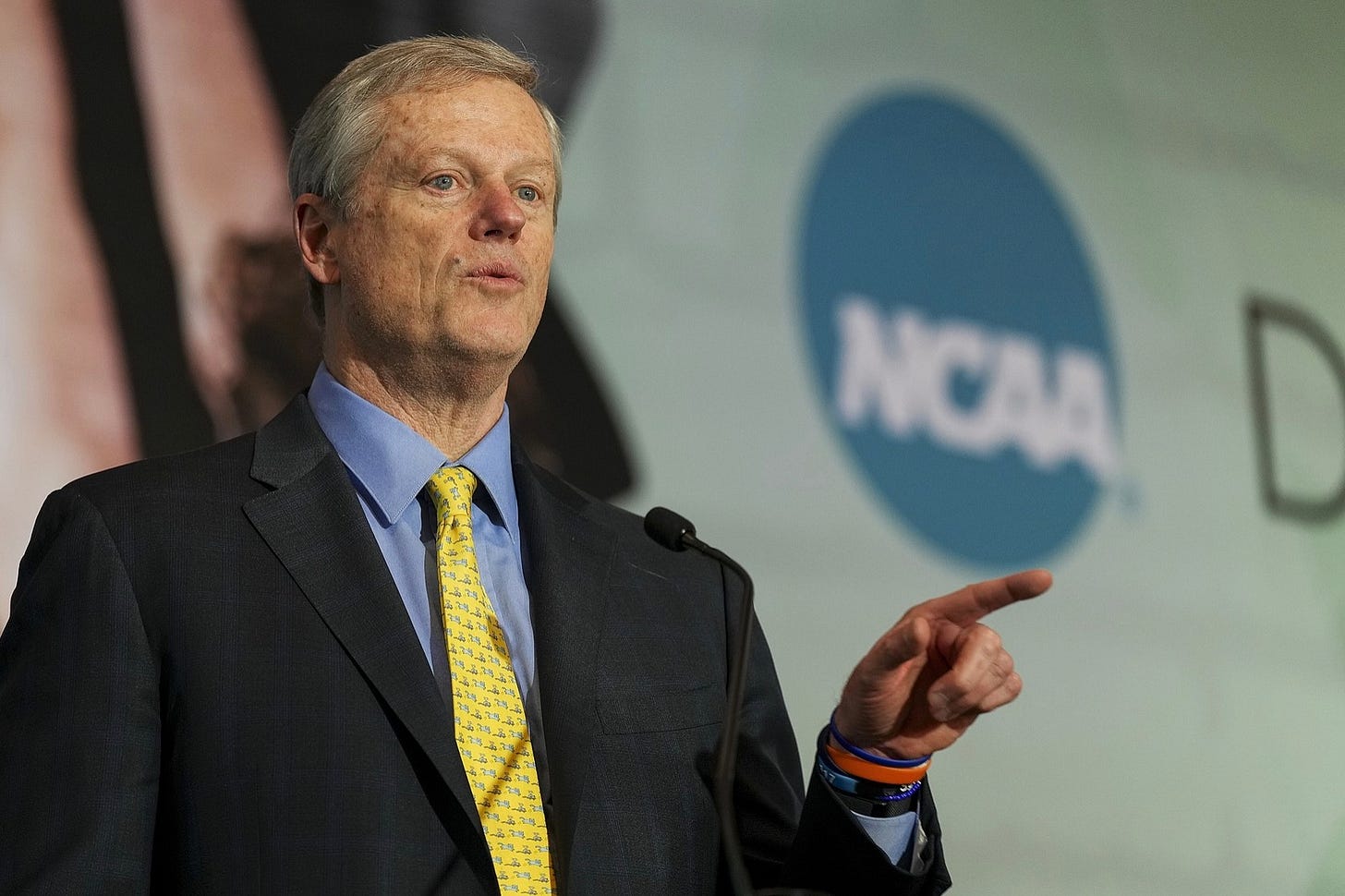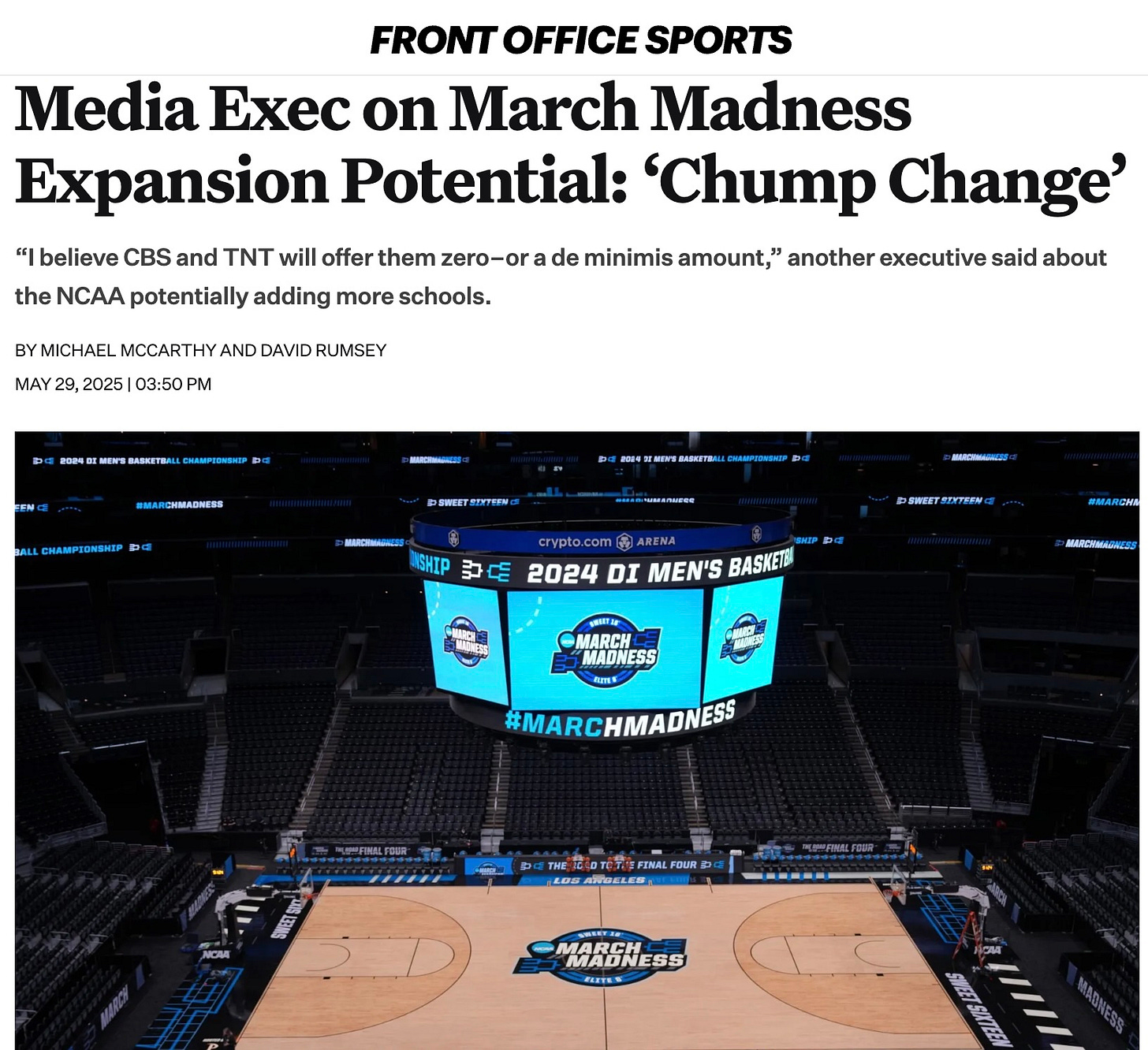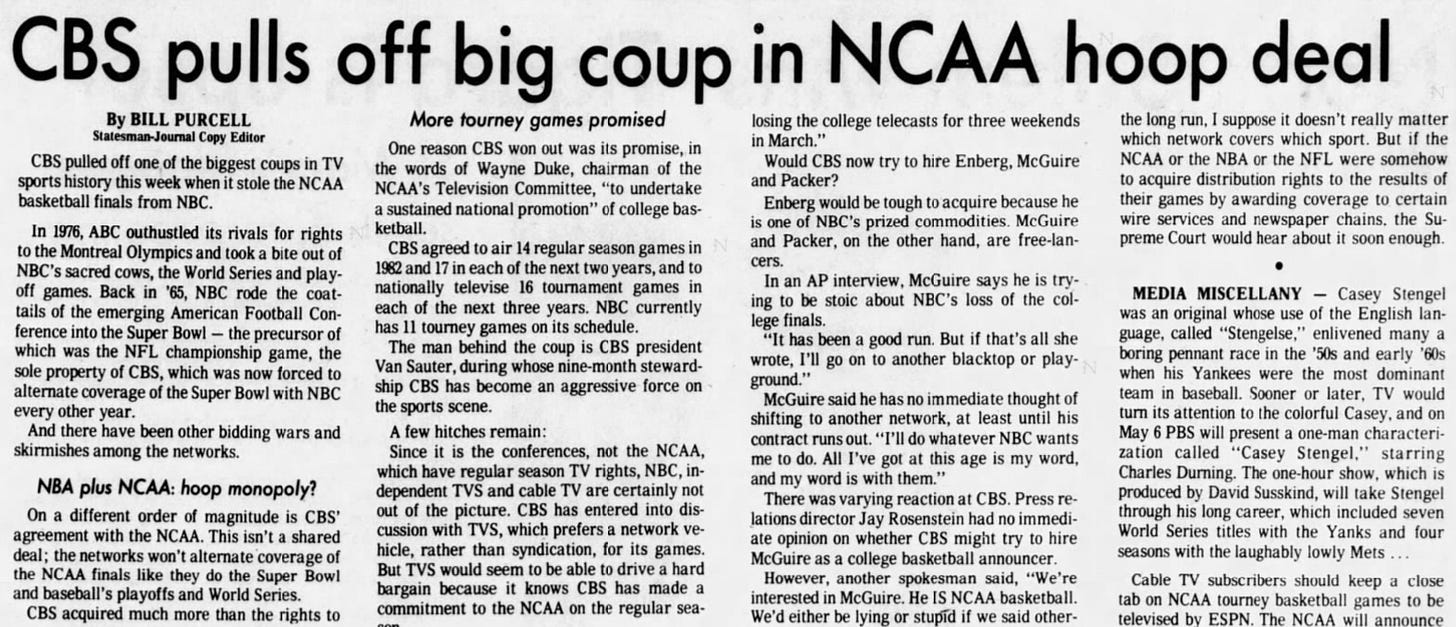Last week NCAA president Charlie Baker set off a fresh round of speculation and outrage by saying “good conversations” were underway with CBS/Warner Bros. Discovery on expanding the men’s Division I basketball tournament. Baker said a 72- or 76-team field could be in place as early as next March.
Now and Again is on the record as viewing a judicious expansion of the field as having the potential to be a positive development. This bit of rank heresy puts this page on a heavily tariffed island with penguins and, to my knowledge, a human population of three: Ken Pomeroy, Seth Davis, and yours truly. Few in number, doubtless, but we’re scrappy.
The other 91 percent of the world plainly believes we’re mistaken, but I must say my erstwhile colleagues have been great about it. They still text, we still chat, and we do fine. We just avoid certain topics like families do every Thanksgiving.
But no longer. Today I wish to pay my friends the tribute of attention. Let’s consider their undoubtedly popular pro-status-quo stance as its own reigning episteme. One working assumption in this consideration is that we tend to be highly resistant to change. This resistance extends even to lavishing fire and brimstone on a preference that 19 and not 21 percent of D-I advance to the championship event.
Naturally, I’m as highly resistant to change as anyone. The only difference is the scenario that terrifies me is a potential defection spearheaded by the SEC and Big Ten and their ilk and the consequent demise of the tournament as the sole recognized national title. Conversely I view another game or even two games on Tuesday and Wednesday as, among other things, a comically small price to pay to boost the probability that a unitary national championship survives.
Another working assumption offered here is that we’re prone to exhibit rather shameless ambidexterity when using evidence. We’re fine with citing Event X as supporting our position even if Opposite of Event X would also be marshaled in the same role.
Baker’s remarks on expansion for example brought forth a commendable piece of reportorial legwork. In turn, this piece was used in such a way as to become a classic of the ambidextrous genre.
If the NCAA isn’t even going to make enough money from expansion to maintain its current payout in “units” (roughly $2 million per team per round), why expand? Fair question, one asked frequently this week along with a link to the above piece. But what if the NCAA were in fact poised to make money hand over fist from expanding? Would the response from the nation and its press corps then be “NCAA, we salute you! Go get yours, much love for expanding …”? Likely not.
We know such a response is unlikely because we saw this scenario play out in the Great Expansion Scare of 2010. Back then the NCAA wasn’t a fretful flunky trailing in the wake of an imperious SEC. It was instead master of all it surveyed, and the organization said it was considering an expansion to 96 teams. Such a step actually could have coincided with a fresh infusion of cash because the NCAA was at that moment negotiating its next rights package for the tournament. As it happens the bracket expanded to 68 instead of 96 after the NCAA was tarred and feathered for weeks as a bunch of rapacious fat cats harrumphing behind their cigars and caviar. Whether the NCAA stands to make money from expansion or not, expansion has been opposed.
The NCAA has banked its money across the decades by conferring what’s recognized as the sole national championship as media rights continue to climb. The size of the field is, within reason, a subsidiary factor in this equation. If units take a hit in 2026 it will be because the NCAA happened to find itself between new contracts and CBS/WBD chose to play hardball on the additional games. Such a sequence would surely be newsworthy politically (a rights holder using its leverage despite the risk of alienating a vital business partner). It would not however be particularly informative economically (a media commodity being priced similarly over seven years whether the event has 67 or 75 games).
Ordinarily the NCAA might prefer to wait until the next contract to discuss expansion. But the SEC is increasingly restive (commissioner Greg Sankey: “I have people in my room asking, ‘Why are we still in the NCAA?’”), so in the short term Baker and the NCAA are indeed in a bit of a bind. Their contract runs through 2032 and the current deal is notoriously lopsided in favor of CBS/WBD.
That said, the relationship between the NCAA and CBS/WBD is reportedly quite amicable. The topic of expansion’s been on the horizon for years, and the two sides have been roughing out scenarios in this direction. Ultimately everyone involved knows if push ever really came to shove Baker does hold one mighty card in his hand. In 2025 he can in effect say to CBS/WBD:
We’re stuck with seven more years on a contract that undervalues March Madness by billions. Now I’m forced to come to you hat in hand just to placate an overprivileged SEC. My job is to preserve a single recognized national championship. To do that I’m adding two or four games. You can say you have zero incentive to give back money you’ve already earned at the negotiating table just to air two or four more games prior to the round of 64. Today you hold those cards. But tomorrow I’ll be back negotiating the next contract, one running into the 2040s. Every network, streaming platform, and tech giant will consider bidding against you. When tomorrow comes I’ll be guided in part by what you choose to do or not do for me today.
History suggests CBS/WBD would be well advised to take the long view. After all, it was a rival network’s eagerness to squeeze every last dollar out of the NCAA that allowed CBS to shock the world in 1981 and land March Madness in the first place.
CBS was able to steal the tournament away only after rights-holder NBC committed an own-goal for the ages. The NCAA’s negotiators (Walter Byers, Tom Jernstedt, Wayne Duke, and Dave Gavitt) initially assumed they’d renew with NBC. Then NBC stunned the NCAA by going to the mat over a measly few hundred thousand dollars. CBS pounced, showing up beneath Byers’ office window with a ukulele and a dozen roses. The rest is history.
While we’re on the topic of history….
From my own idiosyncratic chair as a reader, anti-expansion pieces would benefit from completing the following sentences. “While expanding the field by 21 percent in 1985 proved to be a masterstroke, increasing the size of the bracket by 12 percent or less in 2026 will be harmful because [reason]. While our predecessors in the press were wrong to oppose expansion four decades ago, we’re right to resurrect the same arguments they used because [reason].” To my knowledge a piece covering this ground would be unprecedented.







Thank you for making the argument I’ve been trying to make. In much more eloquent fashion I would say